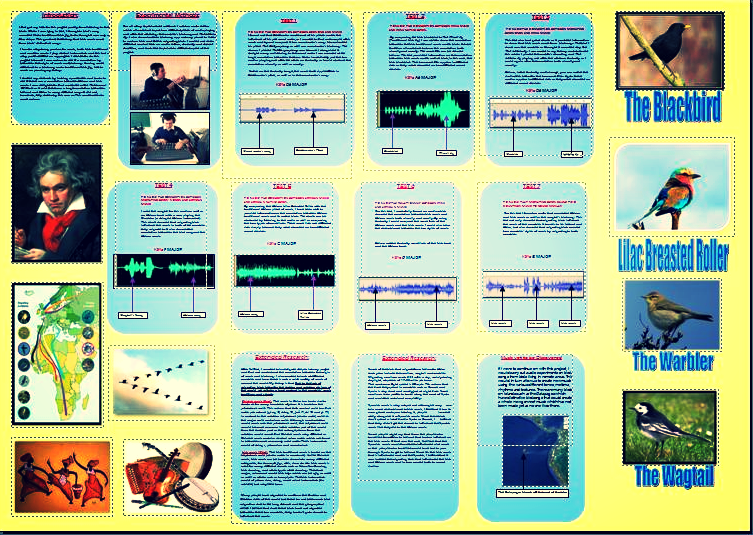Our Hypothesis
- Patrick Sweeney
- Apr 14, 2015
- 4 min read
One of our team members, Patrick, entered a project into the Biology Intermediate Individual section of BT Young Scientist last year called “The Connection Between The Origin Of Music And Birdsong”. This project came third in the Biology section, and since then we have decided to expand and greatly add to the original project/hypothesis. Patrick got the initial idea for this project purely from listening to the birds when he was lying in bed. He thought a bird’s song sounded like a traditional Irish jig, even though it was only a few chirps. This gave him the theory that:
Irish music came from birds’ distinctive songs.
After formulating this theory, he became curious to see if this was the case in other countries too. He tried to see what bird he was listening to when he first got the idea, and discovered it was a swallow. The swallow migrates every year for quite a long period of time from Ireland to Africa. This then made him wonder if there was a connection between the two countries’ music because of migrating birds i.e. Swallows, Wagtails and Warblers
The Atleantean Theory shows a connection exists between Sean Nós singing and African music. This theory establishes a connection between these two countries, but did not explain where this connection came from. The relationship between Sean Nós singing and African music is further investigated in The Atleantean Irish (Bob Quinn). It further supports the theory that our Irish style of singing contains the same melisma and rhythms as African songs.
By the end of the competition last year, Patrick had successfully established his hypothesis and had used programmes such as Audacity (an audio editor file) to display his findings and information. This year, we started our work on this hypothesis by first getting outside opinions on the hypothesis from other scientists.
Dr. Daniel J. Levitin (www.DanielLevitin.org), Professor of Psychology and Neuroscience, McGill University, Montreal, has emailed us saying “this is a viable hypothesis and I would encourage you to test it and publish your results.” Writers from the popular Irish science magazine “Science Spin” have also emailed us, showing a lot of interest in our project.
We have since decided to investigate Fourier's Transform to see if it could be used as a mathematical way to display our findings more clearly. Fourier's Transform is a mathematical equation that is employed to transform signals between the time domain and the frequency domain, which has many applications in physics and engineering. It turns chaos into order and thus allows us to compare and view wave lines of audios in a simpler way. We also decided to build a birdhouse equipped with a camera and voice recorder to record both visual and audio footage of bird songs. The visual footage of the birds allows us to see what types of birds are around us, and to get a clear insight into which birds are actually influencing our music. The audio footage allows us to create more audio comparison files, so instead of using birdsongs from YouTube, we are now able to use our own audios collected by ourselves. To continue on from the hypothesis, we decided to look elsewhere to find where birdsong could possibly be used to influence and create new music. The Galapagos Islands have remained uninhabited for hundreds of years, and there is no bird migration to or from the islands. Because of this, we believe people have not had the chance to use their unique birdsongs to create any form of music. We decided to research many different birds from these islands using footage collected by Chris Watson (www.TouchRadio.org.uk, Chris Watson, the Galapagos Islands, an audio diary) and we have since provided information on creating a new genre of music from using these audios.
Upon completion of this investigation, we have determined the following:
A huge connection lies between Sean-nós Singing and African style singing, including the rhythm and melisma which makes one observe the strong resemblance that can be seen. The Irish type of song called an "Aisling" (vision poem, in Irish) includes many stanzas that all have the same melody. This is also the case with many African songs.
By using Fourier's Transform and Audacity, we have discovered that the native birds of Ireland have influenced Irish music for many years in the past. Since these traditional songs have been passed down from generation to generation and were only written down in the last couple of hundred years by collectors, these songs have varied throughout the ages. If we were able to find the original Irish songs, the connection between the bird song and the Irish song would be even more clear. Many birds that migrate to countries such as Africa every year (wagtail, swallow and warbler) have a huge effect on their national music. Since they spend up to half the year in these foreign countries, they have the time to influence the music, just as they did to Irish music.
Birds all over the world have influenced many genres of music for many years. For example, Beethoven wrote many of his pieces under the influence of his pet wood wren.
We now have the opportunity to create a whole new genre of music by using the different musical features of the native Galapagos Islands birds, as they are so unique and original. From the texture of the music to the rhythms produced, this new music will be very different and special.

















Comments